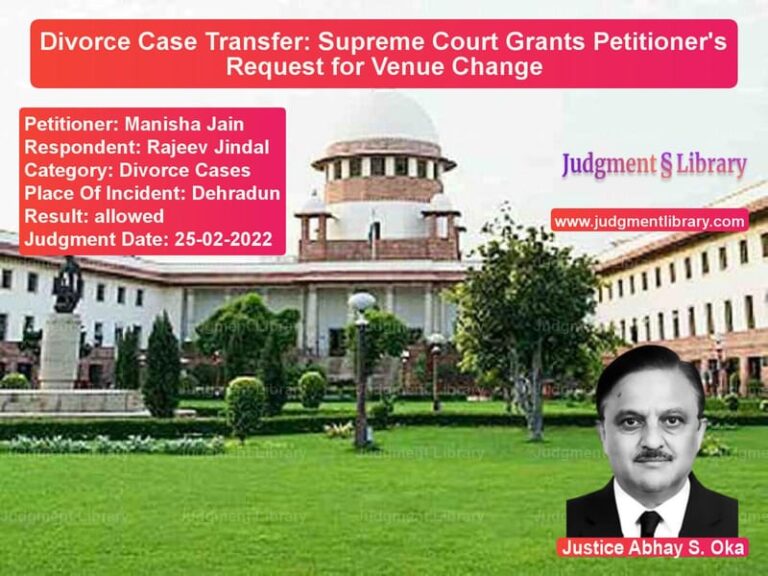Haryana Sales Tax Repeal: Supreme Court Strikes Down Retrospective Tax Recovery
The case of State of Haryana & Ors. vs. Hindustan Construction Company Ltd. concerns the retrospective exercise of tax revision powers under the Haryana General Sales Tax Act, 1973 (hereinafter referred to as the ‘Act of 1973’) despite its repeal by the Haryana Value Added Tax Act, 2003 (hereinafter referred to as the ‘Act of 2003’). The Supreme Court was tasked with determining whether the Haryana Government’s attempt to revise tax assessments and recover amounts under the repealed legislation was legally valid.
Background of the Case
The respondent, Hindustan Construction Company Ltd., had completed its sales tax assessment for the year 1998-99 under the Act of 1973, and a refund was ordered on May 12, 2000. However, after the repeal of the Act of 1973 on April 1, 2003, the Haryana tax authorities issued a show-cause notice on June 7, 2004, under Section 40 of the repealed Act, seeking to recover an amount of Rs. 65,35,632/- from the respondent.
The respondent challenged the order before the Punjab and Haryana High Court, which ruled that the exercise of revisional power under Section 40 of the Act of 1973 after its repeal was unsustainable. The High Court held that the repeal and saving clause under Section 61 of the Act of 2003 only saved pending proceedings but did not permit fresh actions under the old law.
Aggrieved by this decision, the Haryana Government appealed to the Supreme Court, arguing that the Punjab General Clauses Act, 1898, allowed them to exercise powers under the repealed legislation.
Legal Issues
The Supreme Court examined several critical legal questions:
- Whether revisional powers under Section 40 of the Act of 1973 could be exercised after its repeal.
- Whether the repeal and saving clause under Section 61 of the Act of 2003 allowed the state to initiate fresh proceedings under the old Act.
- Whether the Punjab General Clauses Act, 1898, permitted actions under repealed legislation if there was no specific exclusion.
Arguments by the Petitioner (State of Haryana)
The petitioners, represented by their counsel, argued:
- The refund granted in 2000 was wrongful and needed correction.
- The state had the right to exercise suo-motu revisional powers within five years, which made the 2004 show-cause notice valid.
- The Punjab General Clauses Act, 1898, allowed proceedings under a repealed Act unless expressly barred.
- Since the liability accrued before the repeal, it remained enforceable despite the new Act coming into force.
Arguments by the Respondent (Hindustan Construction Company Ltd.)
The respondent countered:
- The repeal and saving clause under Section 61 of the Act of 2003 only preserved pending proceedings.
- There were no pending proceedings against them under the old Act when the new law came into force.
- The state was attempting to revive a repealed provision, which was impermissible under the law.
- The Punjab General Clauses Act, 1898, could not override the legislative intent of the Haryana VAT Act, 2003.
Supreme Court Judgment
The Supreme Court ruled in favor of the respondent and struck down the retrospective recovery attempt by the Haryana Government. The key observations made by the Court were:
- Section 61 of the Act of 2003 saved only pending proceedings, not fresh actions.
- There was no pending revision case against the respondent when the new Act came into force.
- The legislative intent was to provide a complete transition to the new Act and not permit old liabilities to be revived.
- The Punjab General Clauses Act, 1898, could not be used to override explicit provisions in a repealing statute.
Observations of the Supreme Court
The Court stated:
“A simple repeal of an enactment leaves no room for any contrary opinion. If the repeal is followed by a fresh enactment, the applicability of the General Clauses Act requires an examination of the new legislation.”
The Court further ruled:
“The new Act of 2003 clearly manifests an intention to do away with old liabilities that were not pending at the time of repeal. Any attempt to revive Section 40 of the Act of 1973 is unsustainable.”
Conclusion
The Supreme Court’s ruling establishes a crucial precedent in taxation law, emphasizing that:
- Revisional powers under a repealed Act cannot be exercised unless explicitly saved by the new law.
- Governments cannot use general clauses acts to override specific legislative intent.
- Once an Act is repealed, new actions under it cannot be initiated unless expressly permitted.
This decision ensures that taxpayers are protected from retrospective enforcement of repealed tax laws and reinforces the principle of legal certainty in financial legislation.
Don’t miss out on the full details! Download the complete judgment in PDF format below and gain valuable insights instantly!
Download Judgment: State of Haryana & O vs Hindustan Constructi Supreme Court of India Judgment Dated 15-09-2017.pdf
Direct Downlaod Judgment: Direct downlaod this Judgment
See all petitions in Tax Refund Disputes
See all petitions in Banking Regulations
See all petitions in Income Tax Disputes
See all petitions in Judgment by Ranjan Gogoi
See all petitions in Judgment by Navin Sinha
See all petitions in dismissed
See all petitions in Declared Infructuous
See all petitions in supreme court of India judgments September 2017
See all petitions in 2017 judgments
See all posts in Taxation and Financial Cases Category
See all allowed petitions in Taxation and Financial Cases Category
See all Dismissed petitions in Taxation and Financial Cases Category
See all partially allowed petitions in Taxation and Financial Cases Category







